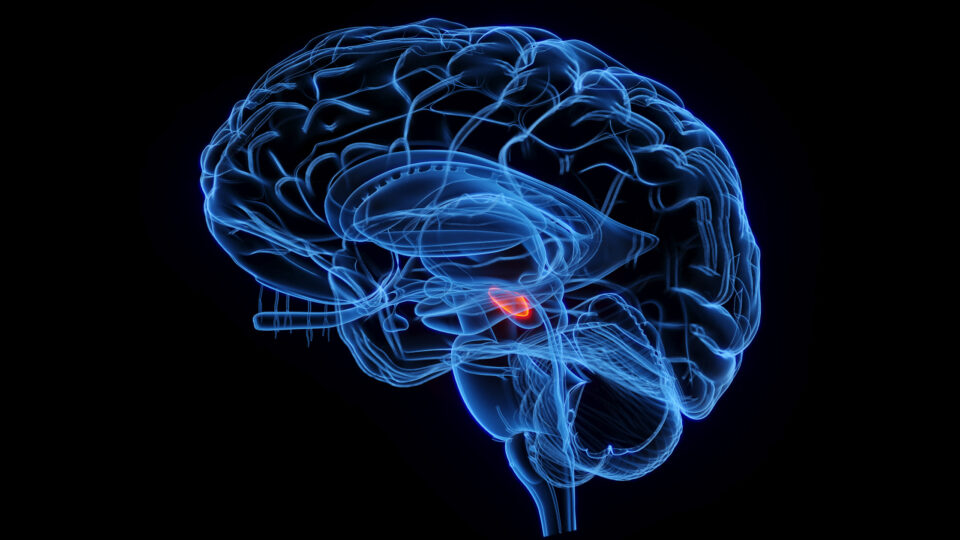Although intravenous and nasally administered forms of ketamine and esketamine have rapid-acting efficacy for major depressive disorder (MDD), with intranasal esketamine being FDA-approved for this indication, their hemodynamic and psychotomimetic properties require a physician’s supervision, limiting their utility.
Recently, the FDA approved a novel type of antidepressant—one that mimics ketamine’s mechanism of action, but without its challenging side effects. Auvelity is the first oral antidepressant that does not primarily target the monoamine neurotransmitters serotonin, dopamine, and norepinephrine. Instead, like ketamine, it targets the N-methyl-D-aspartate (NMDA) receptors, which regulate glutamate.
“[With this medication], patients don’t need to come into a doctor’s office and be monitored for hours afterward. Having a pill that you can take at home is far less cumbersome.”
Dan Iosifescu, MD
According to Dan Iosifescu, MD, a professor of psychiatry at NYU Langone Health who co-led clinical trials for Auvelity, the new drug—a combination of dextromethorphan and bupropion—has several advantages. “It can alleviate symptoms more quickly than other oral antidepressants,” says Dr. Iosifescu. “It also has a practical advantage over ketamine in that patients don’t need to come into a doctor’s office and be monitored for hours afterward. Having a pill that you can take at home is far less cumbersome.”
Previously, Dr. Iosifescu played key roles in the development of ketamine and esketamine as therapies for treatment-resistant MDD, overseeing a research program that produced several pivotal studies. These successful trials, in turn, laid the groundwork for Auvelity.
Laying the Groundwork
In their efforts to identify an oral alternative to ketamine that would not require stringent monitoring, Dr. Iosifescu and his team focused on dextromethorphan—a strong NMDA receptor inhibitor commonly used in cough medications. Because dextromethorphan is metabolized too swiftly to function as an antidepressant on its own, it would have to be combined with a compound that could slow that process. One candidate was quinidine, a stereoisomer of quinine, which blocks the enzyme CYP2D6.
Dr. Iosifescu and colleagues first conducted an open-label trial of Nuedexta, a combination of dextromethorphan and quinidine used to treat pseudobulbar affect. In a paper published in 2017, they reported that many patients with treatment-resistant MDD experienced significant improvements in mood.
Soon afterward, Dr. Iosifescu was approached by representatives of Axsome Therapeutics, who were also investigating dextromethorphan’s potential as an antidepressant. The company asked him to help lead their trials of an experimental drug (later named Auvelity) that paired the chemical with bupropion, a norepinephrine–dopamine reuptake inhibitor that also blocks CYP2D6.
A Pair of Key Studies
The FDA’s decision to approve Auvelity was based on two large studies. The first, with Dr. Iosifescu as lead author, was published in the Journal of Clinical Psychiatry. In a multicenter phase 3 trial, 327 adults with MDD were randomized to either Auvelity or a placebo. After 6 weeks, Montgomery-Åsberg Depression Rating Scale (MADRS) scores fell by an average of 16 points in treated patients, compared with 12 points in those taking the placebo. Nearly 40 percent of those taking Auvelity achieved remission, versus 17 percent with placebo.
The second study, with Dr. Iosifescu as senior author, appeared in the American Journal of Psychiatry. It involved 97 adults with MDD who received either Auvelity or bupropion alone. At the 6-week mark, patients taking Auvelity showed a 14-point drop in MADRS scores, compared with 9 points for those on bupropion. Among the Auvelity group, 47 percent achieved remission, versus 16 percent of the bupropion group. In both studies, Auvelity was superior to the comparator after only 1 or 2 weeks, suggesting a more rapid onset of efficacy compared to other antidepressants.
“These results showed conclusively that dextromethorphan, rather than bupropion, is the main driver of Auvelity’s efficacy,” Dr. Iosifescu explains.
In both studies, Auvelity exhibited a side effect profile comparable to other oral antidepressants, with no indication of metabolic problems or increased sexual dysfunction.
Next Steps
Auvelity is now being prescribed as an alternative or supplemental treatment for patients whose symptoms are not adequately addressed by other antidepressants. Dr. Iosifescu suggests that it should also be studied as a maintenance medication for people who improved after receiving ketamine treatment as an emergency intervention. “In theory,” he says, “those patients could benefit from taking this drug regularly, or as a rescue medication if they suffer a relapse.”
Disclosures
Dr. Iosifescu is a member of the advisory board of Axsome Therapeutics, manufacturer of Auvelity. He has received consulting honoraria from Axsome, which sponsored the trials spotlighted in this article.






